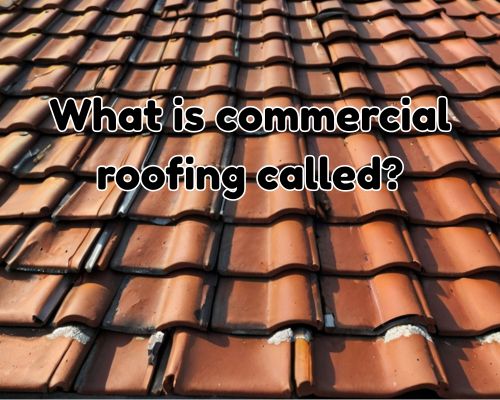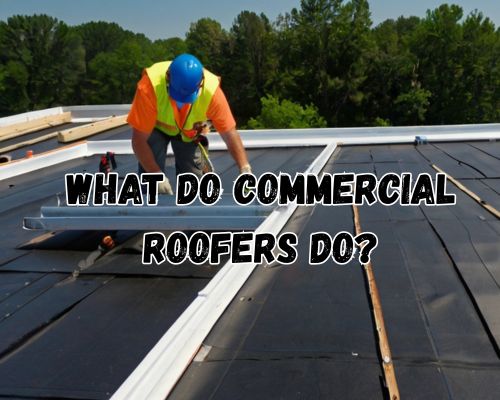
What Is Commercial Roofing Called? Your Definitive Guide in New Jersey, USAWhat Is Commercial Roofing Called? Your Definitive Guide in New Jersey, USA
When it comes to roofing in New Jersey, whether you’re downtown Jersey City or up in Morris County, understanding what commercial roofing is called can save you heaps of confusion — and dollars. Commercial roofing isn’t just “roofing” slapped onto a building. It’s a specialized, complex system designed for large-scale structures like warehouses, office buildings, retail stores, and industrial facilities. With Charles Jimerson of CJ Commercial Roofing NJ, we’ll break down what commercial roofing actually is, its types, terminology, and why it matters especially for businesses across New Jersey.

Understanding Commercial Roofing: What’s in a Name?
The term commercial roofing broadly refers to roofing systems installed on commercial properties — basically, non-residential buildings. Unlike residential roofing, which covers homes, commercial roofs often come with unique materials, designs, and maintenance needs tailored for bigger spaces and different uses.
But here’s the insider scoop: commercial roofing is also frequently called “flat roofing” or “low-slope roofing” because most commercial buildings feature roofs with minimal pitch. This distinction is critical in New Jersey’s climate, where the balance between drainage and insulation can make or break a roof’s lifespan.
Types of Commercial Roofing: Decoding the Jargon
So, what exactly is commercial roofing called beyond just the umbrella term? Here’s a breakdown of the most common types you’ll encounter in New Jersey commercial roofing projects:
1. Built-Up Roofing (BUR)
AKA “tar and gravel roofing,” BUR is one of the oldest and most reliable commercial roofing systems. It’s made by layering bitumen (tar) and reinforcing fabrics, then topping it with gravel for UV protection. You’ll see BUR on older warehouses and factories throughout New Jersey, especially in industrial hubs like Newark and Paterson.
2. Modified Bitumen Roofing
This modern twist on BUR incorporates polymer-modified asphalt to increase elasticity and durability. Modified bitumen roofs are usually installed in sheets and torched down, providing enhanced waterproofing — crucial for New Jersey’s heavy rains and snow.
3. EPDM Roofing (Ethylene Propylene Diene Monomer)
Pronounced “E-P-D-M,” this synthetic rubber membrane is super popular for commercial flat roofs. It’s durable, flexible, and highly resistant to weather extremes — perfect for the varied climate across New Jersey, from urban centers to coastal towns like Cape May.
4. TPO Roofing (Thermoplastic Olefin)
TPO is a single-ply membrane roofing system that’s gaining traction because it’s lightweight, reflective (energy-efficient), and heat-welded for strong seams. It’s often found on newer commercial buildings around the Meadowlands and other business districts in New Jersey.
5. PVC Roofing (Polyvinyl Chloride)
PVC roofs are similar to TPO but offer superior chemical resistance, making them ideal for commercial properties like restaurants and manufacturing plants in New Jersey that might face chemical exposure.
For more, visit https://cjcommercialroofingnj.com/.
Why Is Knowing the Commercial Roofing Name Important in New Jersey?
Understanding the correct terminology isn’t just geeky jargon; it has real-world implications for maintenance, insurance, and regulatory compliance in New Jersey:
- Insurance & Warranties: Insurance providers in New Jersey ask for specific roof types to determine risk and premiums. Calling it by the right name helps avoid claim disputes.
- Building Codes: New Jersey’s state and local building codes may mandate specific roofing materials or installation methods depending on your commercial roofing system.
- Maintenance: Knowing whether you have a TPO or modified bitumen roof guides your maintenance schedule, especially with New Jersey’s mix of humid summers and snowy winters.
- Energy Efficiency: Choosing the right commercial roof type impacts energy costs. For example, reflective TPO roofs reduce cooling costs in New Jersey’s hot summers.
Local New Jersey Roofing Companies and Commercial Roofing Trends
If you’re in New Jersey and you want your commercial roofing to last through the brutal winters and muggy summers, it’s wise to tap into local expertise. Companies like NJ Roofing Solutions, Garden State Commercial Roofing, and Tri-State Roofers specialize in commercial roofing systems tailored for New Jersey’s unique climate and regulations.
Recent trends show a surge in green commercial roofing and cool roofs in New Jersey — these roofs reflect sunlight and reduce heat absorption, boosting sustainability and lowering utility bills for businesses.
Key Salient Entities & LSI Keywords for “What Is Commercial Roofing Called?”
To juice your SEO and resonate locally, sprinkle these words throughout your content:
- Commercial roofing systems
- Flat roofing
- Low-slope roofing
- Roof membrane
- Roofing materials New Jersey
- Commercial roof installation
- Roof maintenance New Jersey
- Roof repair NJ
- Energy-efficient roofing
- New Jersey commercial buildings
- Roof warranty and insurance
- Green roofing solutions New Jersey
- TPO, EPDM, BUR roofing
- Industrial roofing New Jersey
- Waterproof roofing solutions
How to Choose the Right Commercial Roofing System in New Jersey
Choosing the right roofing system is a business decision that affects operational continuity and costs. Here’s a quick checklist tailored for New Jersey commercial properties:
- Assess the Roof Slope: Flat or low-slope roofs dominate commercial buildings. This factor narrows down your roofing system choices.
- Consider Climate Impact: New Jersey experiences hot summers, cold winters, and frequent storms. Your commercial roofing must withstand temperature swings, snow load, and heavy rain.
- Energy Efficiency: Look for roofing types with reflective coatings or membranes like TPO and cool roofs to reduce energy consumption.
- Budget and Lifespan: Built-Up Roofing (BUR) lasts longer but costs more upfront. EPDM is budget-friendly but may need more maintenance.
- Local Code Compliance: Verify your commercial roofing choice meets New Jersey state and municipal codes.
- Hire Experienced Contractors: Use NJ local roofing specialists who understand commercial roofing intricacies and the regulatory landscape.
Maintenance Tips for Commercial Roofs in New Jersey
After installation, maintenance is king. Here’s what New Jersey businesses should prioritize:
- Regular Inspections: Twice yearly checks, especially post-winter and after storms.
- Debris Removal: Clear leaves, branches, and snow to prevent water pooling.
- Sealant Checks: Commercial roofing membranes often require re-sealing every few years.
- Drainage Maintenance: Ensure gutters and drains are clear to prevent water damage.
- Prompt Repairs: Address leaks or damages immediately to avoid costly structural problems.
Final Thoughts: Demystifying “What Is Commercial Roofing Called?” in New Jersey
Commercial roofing isn’t just a “roof” slapped on a business building. It’s a carefully designed, material-specific system, often known as flat roofing or low-slope roofing, that keeps commercial properties safe and energy-efficient in New Jersey’s challenging climate.
Whether it’s EPDM, TPO, BUR, or modified bitumen, knowing the terminology helps you make informed decisions about installation, maintenance, insurance, and compliance. For New Jersey businesses, partnering with local commercial roofing experts ensures you get a roofing system tailored for longevity and performance.
Next time someone asks, “What is commercial roofing called?” you’ll drop knowledge bombs that impress, informed by local New Jersey insights, industry jargon, and SEO power. Now that’s a roof you can stand under with confidence!
